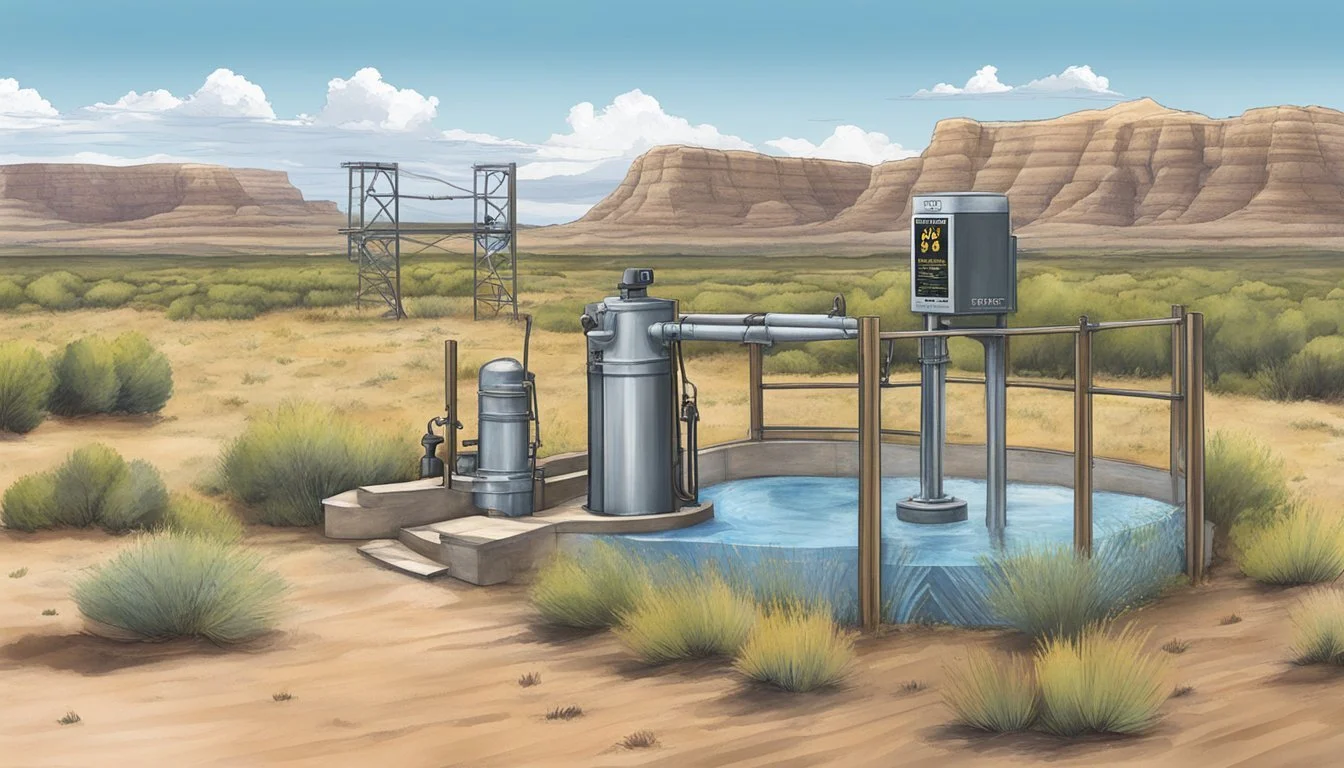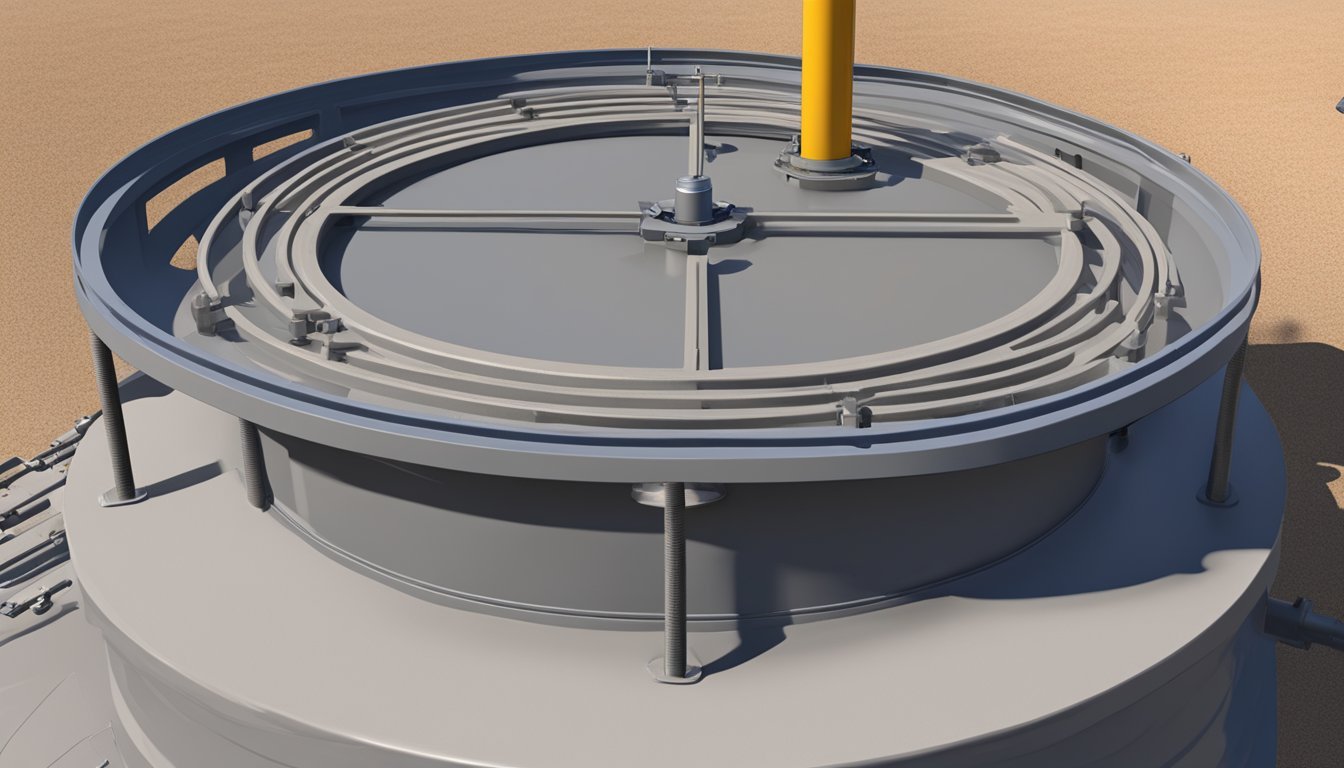New Mexico Water Well Regulations
Understanding Legal Requirements
Water well regulations in New Mexico are designed to manage the appropriation and beneficial use of groundwater, a resource essential for the state’s agriculture, industry, and personal use. Groundwater accounts for a significant portion of the state's water supply, making the rules governing its extraction, use, and conservation crucial for sustainable water management. The New Mexico State Engineer's Office is responsible for overseeing these regulations, ensuring that water rights are properly allocated and that wells are constructed, maintained, and plugged in accordance with state laws.
These regulations include specific guidelines for well driller licensing, as well as the construction, repair, and plugging of water wells, which are critical to prevent contamination and preserve water quality. Individuals and entities looking to drill a well must navigate these rules and regulations to ensure compliance with the standards set forth by the state. This allows for the protection of the resource, while also safeguarding the rights and interests of the various stakeholders, including private well owners, agriculture businesses, and public water systems.
Well owners in New Mexico are tasked with the responsibility of understanding and upholding these regulations, a task that includes regular water sampling and analysis to ensure safe drinking water. Moreover, the regulatory framework guides well owners about well water quality and provides support for maintaining access to clean and safe drinking water. By adhering to these state-mandated guidelines, well owners and operators contribute to the overall management and conservation of New Mexico's precious groundwater resources.
Legal Foundations
In New Mexico, water well regulation relies on a robust legal framework that ensures the responsible use and management of the state's water resources. The key aspects of this framework include foundational water laws, the responsibilities of the Office of the State Engineer, and specific requirements for well driller licensing.
New Mexico Water Law
New Mexico water law operates on the doctrine of prior appropriation, which means water belongs to the public and rights are granted to use it for beneficial purposes. Legal precedence is given to the oldest water rights in the system. This framework is supported by the New Mexico Constitution and defined under Article 16, Sections 2 and 3, focusing on beneficial use as the basis and measure of water rights.
Office of the State Engineer Responsibilities
The Office of the State Engineer (OSE) administers water rights and provides regulatory oversight for water resources in New Mexico. It has comprehensive responsibilities including the formulation of rules and regulations to facilitate water rights administration. Their duties also cover the implementation of the active water resource management strategies to safeguard water supplies for current and future generations.
Well Driller Licensing Requirements
In New Mexico, individuals responsible for well drilling operations must hold a valid driller license, complying with detailed regulatory standards for construction, repair, and plugging of wells as outlined in Title 19, Chapter 27, Part 4 of the New Mexico Administrative Code. Prospective licensees must also pass an exam that assesses knowledge of relevant state laws and well construction standards, reinforcing the importance of professionalism and expertise in the field.
Well Permitting Process
In New Mexico, drilling a water well requires strict adherence to state regulations which mandate obtaining a valid permit for water appropriation. This section navigates through the intricacies of the permit application process and how water rights and appropriation impact the issuance of permits.
Permit Application Process
Before drilling a well, individuals or entities must complete a permit application. This process involves submitting detailed information about the proposed well location, purpose, and expected water usage. Applicants must obtain a license from the New Mexico Office of the State Engineer before commencing any drilling operations. The application must also include a non-refundable filing fee, which varies depending on the specific type of well and its intended use.
Water Rights and Appropriation
Water rights in New Mexico are based on the doctrine of prior appropriation, where water is allocated to individuals or entities in order of their application date, known as "first in time, first in right." Therefore, an applicant must demonstrate that their use of water will not impair existing water rights. For domestic uses, such as a single household, the maximum permitted diversion is typically 1.0 acre-foot of water per annum. If an existing well is being replaced, the regulations require the old well to be plugged, or both wells to be metered—an important detail that could influence project costs.
Construction Guidelines
In New Mexico, water well construction must adhere to stringent standards set forth by various regulatory bodies to ensure both the environmental integrity and the safety of water supplies.
Construction Standards
In the context of well construction, it is crucial that materials used are in new or good condition to prevent contamination of water sources. The New Mexico Environment Department stipulates that construction practices should not introduce substances that can lead to water or subsurface contamination. The mandates include:
Using appropriate sealing materials to avoid seepage.
Ensuring the casing is structurally sound to maintain the well's integrity.
Implementing proper sanitary seals to prevent surface pollutants from entering the well.
They enforce these guidelines to maintain the water's purity from the point of extraction.
Industry Compliance & Standards
Compliance with industry standards is vital for well construction to align with the state’s environmental goals and public health objectives. The New Mexico Office of the State Engineer emphasizes the importance of following regulations that oversee well driller licensing and well construction.
Industry Standards: The industry adheres to standards set forth by the American Water Works Association (AWWA), American Society for Testing and Materials (ASTM), and American National Standards Institute (ANSI). This ensures that the construction of wells meets both national and state-level quality benchmarks.
Regulatory Bodies: State regulations are in place that requires drillers to have knowledge of these standards and gain necessary certification.
Drill Rig: Any drill rig used must meet operational standards and requirements for safety and environmental protection, underlining the need for regular inspections and compliance with the current regulations.
Well Drilling Operations
In New Mexico, well drilling activities are tightly regulated to ensure the proper management of water resources. All well drilling operations are required to adhere to stringent regulations enforced by the State Engineer, including supervision, operational planning, and adherence to safety and environmental protocols.
Drill Rig Supervision
A licensed drill rig supervisor is a mandatory requirement for well drilling operations in New Mexico. These supervisors are tasked with overseeing the drilling process and ensuring that it conforms to the established rules. They must have a valid license and pass a New Mexico Code Exam. Supervisors are also required to meet continuing education mandates to maintain their licensing and stay updated on the latest well drilling technologies and laws.
Plan of Operations
Every well drilling project must have an approved plan of operations on file with the State Engineer’s office. This comprehensive document details the method of drilling, the materials to be used, the anticipated depth and diameter of the well, and the measures that will be taken to prevent contamination of the water supply. It must be available for inspection on the drilling site, confirming compliance with the specified sections of the New Mexico Administrative Code.
Safety and Environmental Procedures
Well drillers in New Mexico are required to implement safety protocols to protect both workers and the environment during drilling operations. Drillers must make sure they are in compliance with regulations from the Environmental Protection Agency on waste disposal, ground water protection, and air quality. Adherence to these regulations ensures that water resources are adequately protected for future use, while also safeguarding the local ecosystems and public health.
Health and Environmental Protection
In addressing the health and environmental concerns related to water wells in New Mexico, two main areas come to the forefront: quality testing to ensure water is safe for consumption and initiatives to prevent and respond to contamination.
Water Quality and Testing
Regular testing of private well water is the responsibility of the well owner in New Mexico, focusing on crucial parameters like total coliform, nitrates, lead, and arsenic to guard against health hazards. The state provides resources to assist owners in this process, emphasizing that well-maintained water quality is central to the health of consumers.
Parameters to Test Regularly:
Total Coliform: Indicator of bacterial contamination.
Nitrates: Can cause health issues if levels are too high.
Lead: A toxic metal that can be harmful even at low exposure levels.
Arsenic: Natural contaminant that can lead to serious health problems.
The Environmental Protection Agency (EPA) establishes the standards for testing these parameters to prevent adverse health outcomes.
Contaminant Prevention and Response
Preventative measures and a swift response strategy are paramount for protecting water quality in the face of contamination risks. Regulations and guidelines, although not as stringent for private wells, still apply regarding well construction and maintenance to prevent contaminants from entering the water supply.
Prevention Strategies:
Ensuring well integrity to prevent surface contamination ingress.
Regular inspection and maintenance of the well and its components.
In the event of contamination, there are protocols for testing and remediation to restore water quality and safeguard environmental and public health. Local authorities can also offer guidance on addressing specific contaminant issues.
Maintenance and Record Keeping
Maintaining a water well in New Mexico involves regular testing and repair to ensure compliance with state regulations. Accurate well records are not only a legal requirement but also essential for tracking the well's history and condition.
Well Maintenance and Repair
It is crucial for the longevity and safety of a water well to undergo regular maintenance. Owners should test the water quality annually to ensure it meets health standards. In the event of a system failure or contamination, immediate repairs must be carried out by a licensed professional. New Mexico provides resources to support well owners in maintaining their water supply private well water quality.
Annual Testing: Conduct water quality tests for contaminants.
Licensed Repairs: Employ licensed drillers for any repair work.
Well Log and Record Filing
Well logs and records document the construction, alterations, and services performed on a well. These records must be accurately filed with the state engineer to comply with New Mexico's regulations. Well logs provide detailed information such as depth, water levels, and geologic formations encountered during drilling.
Well Log: Detailed construction report.
Record Filing: Submission of logs and repair records to the state.
Well Closure Procedures
When a water well is no longer in use in New Mexico, specific procedures are enforced to safeguard groundwater resources. These closure processes are meticulously designed to prevent contamination of the aquifers.
Well Plugging Standards
In New Mexico, water wells that are decommissioned must be securely plugged to protect against contamination. The New Mexico Administrative Code stipulates that the top of the well's annular space is sealed with an appropriate cover to prevent foreign materials and fluids from entering, and to disallow groundwater from escaping upwards. The well plugging standards indicate that sealing materials, such as cement grout or bentonite clay, must be used to create a permanent barrier between the well bore and the groundwater.
The process typically includes:
Removal of pumping equipment: All pumps and related equipment are removed.
Disinfection: The well is disinfected to eliminate any potential biological contaminants.
Plugging Material: Placement of approved plugging materials in the well to prevent vertical movement of water.
Post-Closure Reporting
Following the completion of the plugging process, the details of the procedure must be reported to the appropriate authorities. The Well Driller Information and Reports section under the New Mexico Office of the State Engineer outlines that a detailed account of the well closure, including materials used and techniques employed, must be submitted. This ensures that the well closure adheres to state regulations and allows for state verification to maintain the integrity of groundwater resources.
Report submissions include:
Verified Techniques: Listing of techniques and materials used for plugging.
Certification by Licensed Personnel: The work must be certified by a licensed well driller or supervisor.
Records Maintenance: Copies of the closure report are maintained for future reference.
Additional Considerations
When considering the regulations surrounding water wells in New Mexico, one must pay close attention to the environmental impacts of drilling, adherence to property and land use regulations, and the influence of private wells on public health. These elements are critical when evaluating the sustainability and legality of water well operations.
Environmental Impacts of Drilling
Drilling for groundwater in New Mexico must be conducted in a manner that prevents contamination and safeguards against the deterioration of hydrogeological units. Environmental regulations specify that all wells should be constructed to avert the intermingling of aquifers and to block substances that could contaminate drinking water sources.
Property and Land Use Regulations
Property owners in New Mexico aiming to construct private wells must acknowledge the land use regulations governing the location and use of their wells. The regulatory framework includes ensuring an appropriate distance from septic systems to prevent cross-contamination. Information on these regulations can be obtained through public handouts that detail the principles of water rights and land use in the state.
Private Wells and Public Health
The maintenance and monitoring of private wells are critical for protecting public health. The New Mexico Department of Health strongly recommends regular water sampling to ensure that the drinking water meets safety standards. Property owners are responsible for testing their water quality and mitigating any health risks associated with the presence of contaminants in their private wells.
Professional Development
Professional development within the realm of New Mexico water well regulations ensures that well drillers and drill rig supervisors maintain and enhance their technical competencies. A robust framework for continuing education demonstrates the commitment to quality and safety in well construction and maintenance.
Continuing Education for Drillers
Well drillers in New Mexico are required to pursue continuing education to keep their licenses current. The regulations mandate that well drillers must complete approved courses that are designed to refresh their knowledge and introduce new techniques and safety norms. This coursework often aligns with standards set by entities like the National Ground Water Association (NGWA) and the American Petroleum Institute (API), ensuring that the education is relevant and industry-recognized. For an individual to maintain a licensed status, the New Mexico Office of the State Engineer outlines that drillers must pass the New Mexico Code Exam and meet other continuing education requirements periodically.
Public Awareness and Education
The role of professional development extends beyond individual drillers to encompass public awareness and education. The state encourages professionals to engage with the community, spreading understanding about water resource management and the significance of properly constructed wells. By educating the public, drilling professionals foster a collaborative approach to water usage and conservation. Efforts in this area enhance the perception of the industry and promote environmental responsibility.
Technical Specifications
New Mexico's water well regulations ensure the responsible utilization of its water resources. These rules protect the integrity of aquifers, public waters, and hydrogeologic units while providing for the construction of safe and sustainable water wells.
Well Design and Components
The design of a water well in New Mexico must adhere to specific components and features. Wellheads must have a securable opening of at least 1/2" diameter for water level measurement, and for artesian wells, a valve for pressure gauge connection is mandatory. Proper well design circumvents the contamination of groundwater and ensures stable well structure throughout its operation.
Casing and seal: To avoid inter-aquifer exchange and protect the surrounding underground water basin, well casing and grouting materials must meet certain standards.
Screens and Filters: These are critical in maintaining the sustainability of the aquifer and reservoirs, preventing sediment from entering the well.
Hydrogeological Considerations
Hydrogeological considerations are pivotal in the regulation of well drilling to ensure that subterranean resources like lakes and reservoirs are conserved, and quality of water is maintained.
Aquifer Capacity: Understanding the storage and flow characteristics of targeted hydrogeologic units is vital.
Monitoring: Includes regular checking for any changes in levels of underground water basins that could indicate unsustainable usage.
Thorough technical specifications within New Mexico's well regulations balance resource extraction with long-term viability and environmental stewardship.
Frequently Asked Questions
This section addresses common inquiries related to water well regulations in New Mexico, providing authoritative guidance for individuals navigating the state's water rights and drilling regulations.
How can I obtain a permit for drilling a well in New Mexico?
To drill a well in New Mexico, one must obtain a license from the State Engineer's office. Unlicensed drilling is illegal, and all applications for new wells must comply with state regulations.
What are the costs associated with drilling a new water well in New Mexico?
Costs for drilling a water well in New Mexico vary based on several factors, including location, depth of the well, and the drilling technique used. Prospective drillers must also consider the permit fees and the cost of hiring a licensed driller.
Can one sell their water rights in New Mexico, and what is the process?
In New Mexico, it is possible to sell water rights, subject to the approval of the State Engineer’s office. The process involves a formal application, which is reviewed to ensure the proposed transfer does not impair existing rights or the public welfare.
What is the process for searching water well permits in New Mexico?
To search for water well permits in New Mexico, individuals can utilize the NM Water Rights Reporting System (NMWRRS), which offers online access to OSE water right files, well reports, and driller license reports.
Who is responsible for regulating water wells and water rights in New Mexico?
The regulation of water wells and water rights in New Mexico falls under the jurisdiction of the State Engineer. This office oversees water appropriations and ensures sustainable use and management of the state's water resources.
What are the minimum depth requirements for a water well in New Mexico?
The minimum depth for a water well in New Mexico is not specified as a one-size-fits-all regulation, as it largely depends on local geology and the targeted aquifer. Licensed well drillers assess the specific site conditions to determine the necessary depth for reliable water access.









